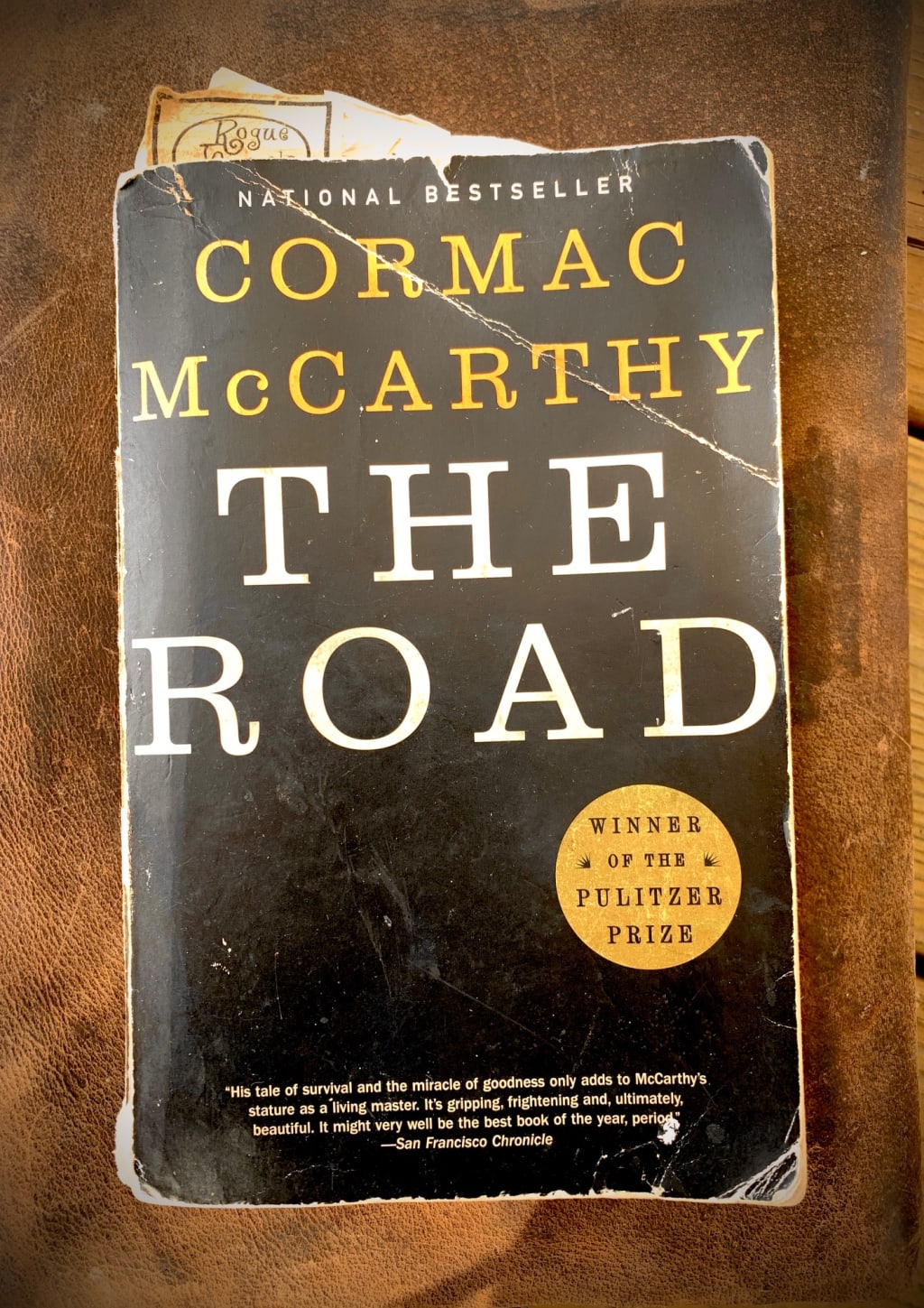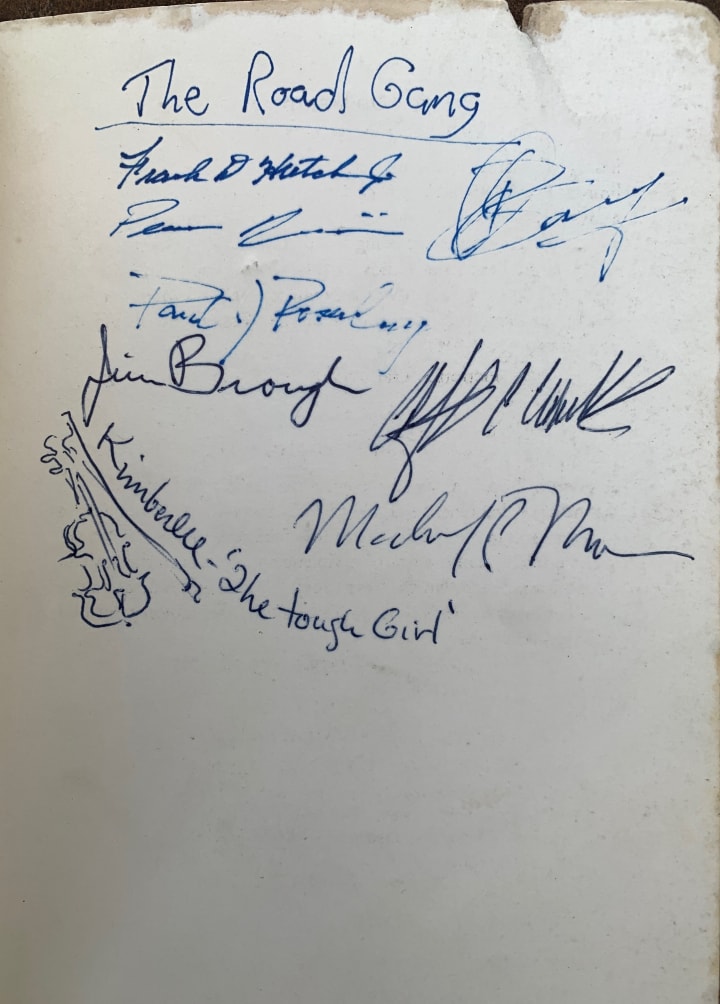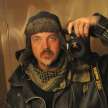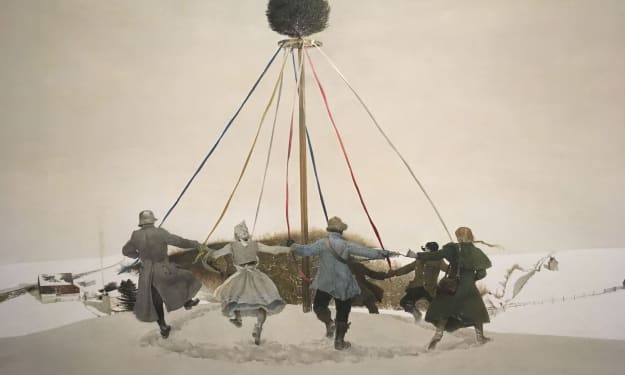THE ROAD by Cormac McCarthy
When words and sons carry fire

The Man wakes in the dark in the post-apocalyptic landscape, his son known only as the Boy, sleeps beside him, the father’s hand on his little chest feeling it rise and fall “with each precious breath.” We do not know what befell the earth and we never will. All we know is that the“Barren, silent, godless” world is dying and they need to move south or they will not survive the coming winter.
“Nights dark beyond darkness and the days more gray each one than what had gone before. Like the onset of some cold glaucoma dimming away the world.”
Over its modest 285 pages McCarthy journeys The Man and the Boy through the bleak “jackstraw land” with their only companion being the road on which they tread. The ruined asphalt is their only continuity in a world fatally sunk in its own inexorable unmaking and a character unto itself. It is its own silent narrator giving voice to the horrors that it witnessed – Violent cracks and thick debris from continuing earthquakes and storms, the rotting remains from cannibals’ feasts, even that of a baby and at its most dark, thick rolling tar entombing the burnt dead who could not escape a long ago firestorm. In The Road no one has names adding to the anonymous isolation of all who have somehow survived.
But they are not alone. There is a foreboding sense that they are being followed, cannibal gangs everywhere, a lone dog in their periphery and later in the book, a blind old man who has not been given the mercy to die. In its most horrifying moment the Man stumbles upon a basement of sorrowing captives, their limbs hacked off and being used as living food. McCarthy fully realizes in his work the darkest forces lurking in the human soul, the consummations of evil. But it is never depicting evil for evil’s sake, but setting the dark counterpoint to those who bear the light. But there is another lurking enemy. As the Man sits besides a campfire wracked in coughing, a fine spray of blood coats the gray snow.
In the Pulitzer Prize winning The Road McCarthy is at his most bleak but at the height of lyricism. Known for his sumptuous arias of violence in his masterpiece Blood Meridian to his tense exploration of greed and evil in No Country for Old Men, here McCarthy’s power is in his sparse restraint, to express much in few words. This is evidenced in the opening as the Boy awakes.
“Hi, Papa.
I’m right here.
I know.”
In these few sentences the entirety of the novel is contained: a father who will protect his son at all costs and the son who knows it. McCarthy is a master of language and capable of the most visual expressions known in literature and eschewing standard punctuations because he thinks they are unsettling to look at on the page. You will never find a quotation mark in a McCarthy novel which for some is maddening. But McCarthy doesn’t care. Follow along or don’t. He will employ words you understand only by context just to find he made them up. If a master writer’s vocabulary is a mansion McCarthy’s has two extra wings attached. Like great opera McCarthy inhabits the musicality of literature – from sparse simplicity to grand literary crescendos, all is written with a command of language and rhythm that is signature to his style.
“Like pilgrims in a fable swallowed up and lost among the inward parts of some granitic beast. Deep stone flues where the water dripped and sang. Tolling in the silence the minutes of the earth and the hours and the days of it and the years without cease.”
Lesser writers could have just written “Tolling in the silence in minutes, hours, days and years without cease.” It would still be a wonderful line. It states what needs to be said but would lack the poetic nuance which transforms it from just a simple description into a flowing lyrical expression.
McCarthy also takes brief pauses from the narrative just to convey a deeper stand alone commentary, a keen witness of the world he's creating.
“No lists of things to be done. The day providential to itself. The hour. There is no later. This is later. All things of grace and beauty such that one holds them to one's heart have a common provenance in pain. Their birth in grief and ashes.”
Like a painter, McCarthy is a fierce observer of the real world as well. You know from his dense descriptions he’s seen the dead, walked the plains during the rain and taken in mountains under the moonlight and all this filed away in a vast repertoire of memory from which to draw from.
“They picked their way among the mummified figures. The black skin stretched upon the bones and their faces split and shrunken on their skulls. Like victims of some ghastly envacuuming.”
And this keen observance translates to his consummate dialog between the Man and the Boy as the frightened child wakes from a bad dream.
“What is it?
Nothing. I had a bad dream.
What did you dream about?
Nothing.
Are you okay?
No.
He put his arms around the him and held him. It’s okay, he said.
I was crying. But you didn’t wake up.
I’m sorry. I was just so tired.
I meant in the dream.”
You can’t write dialog like that without having a child of your own and paying close attention to how they think and speak which McCarthy drew from with his own son. And the surprise turn of dialog at the end also serves as nervous portend and revealing the child’s deepest fear: losing his father in this horrid world.
The Road was my first encounter with McCarthy having somehow missed the memo my entire life. I had never read anything like him and it deeply transformed my view on writing. I had written on and off since I was a child, but now something had irrevocably shifted. I now wanted to be a writer and not just dabble in the margins. I wanted to create works at this level of mastery which is an impossible standard when you’re first starting out as one realizes only McCarthy writes like McCarthy. But a fire was set in me now and I could no longer ignore it. But there is a deeper reason that this book holds so much significance for me.
My brother Shaun was in the movie.

Casting directors were looking for long haired skinny people in the Pittsburgh area and my brother fit the bill perfectly. He was cast as part of the cannibal gang that rolls up in the first act terrifying the Man and the Boy. My brother and the gang were out there for five frigid nights but despite the cold were just thrilled to be a part of this project. He had taken his young son to set and got to meet Viggo Mortensen who played the Man and Kodi Smit-McPhee who played the Boy. Cast members signed his copy of the book along with director John Hillcoat and the extraordinary actor Garret Dillahunt (Fear the Walking Dead and Deadwood).
In 2010 my brother gave me his copy of the book.

To this day I carry it with me when I travel to remind myself what beautiful language is. Often before I write I read a chapter to jump start me. Not to imitate but to feel the language and rhythm.
Every writer stands on the shoulders of giants. McCarthy stood on Faulkner and Hunter S Thompson typed out the entirety of The Great Gatsby just to know what it felt like to write that novel. We see our antecedents yet find our unique way forward. A desire to write means you are a writer and it’s our job, however saturated with insecurities, to fearlessly put our fingers to the blank page ahead of us. And I have McCarthy to thank. Pynchon, Kingslover, Tolkien, Gabriel García Márquez and countless others have stirred me and given me inspiration but there’s a specific reason McCarthy was the one that crested me over the hill.
The Road was the last book I read before my brother took his life.
My brother was falsely accused by his own son of the kind of thing that never leaves your life even if you’re found innocent, which my brother was. My nephew suddenly became the antithesis of the Boy.
It placed a bookmark in time irrevocably fusing The Road with my brother's death - a life delineated into the before and after of these things. In my brother’s suicide note, despite his son’s betrayal, he wrote to him saying, “Be strong and carry the fire.” Anyone who’s read the book will instantly recognize the line.
“We’re going to be okay, aren’t we Papa?
Yes. We are.
And nothing bad is going to happen to us.
That’s right. Because we’re carrying the fire.
Yes. Because we’re carrying the fire.”
But bad things did happen. The Man is overtaken by his ever worsening disease, dying and leaving his son alone. My mother found my brother, the image seared into her memory. Two sons orphaned by radically different reasons. But in the bleakness of these tragedies both McCarthy and my brother try to levy some hope - To carry on. The Boy is taken in by a couple who had been watching them the entire time. My nephew growing up to take responsibility for what he had done leading to a delicate reconciliation. In McCarthy’s enigmatic but poetic finish he writes:
"Once there were brook trouts in the streams in the mountains. You could see them standing in the amber current where the white edges of their fins wimpled softly in the flow. They smelled of moss in your hand. Polished and muscular and torsional. On their backs were vermiculate patterns that were maps of the world in its becoming. Maps and mazes. Of a thing which could not be put back. Not be made right again. In the deep glens where they lived all things were older than man and they hummed of mystery."
A hope however dim is still hope. The Road arrived at the ordained time for me, providential and poignant and locked itself into my own narrative of loss and redemption. A staggering work of grim beauty. I’ll never be the same and am grateful for it.

About the Creator
Kevin Rolly
Artist working in Los Angeles who creates images from photos, oil paint and gunpowder.
He is writing a novel about the suicide of his brother.
http://www.kevissimo.com/
FB: https://www.facebook.com/Kevissimo/
Enjoyed the story? Support the Creator.
Subscribe for free to receive all their stories in your feed. You could also pledge your support or give them a one-off tip, letting them know you appreciate their work.
Reader insights
Outstanding
Excellent work. Looking forward to reading more!
Top insights
Heartfelt and relatable
The story invoked strong personal emotions
Expert insights and opinions
Arguments were carefully researched and presented
Compelling and original writing
Creative use of language & vocab
Eye opening
Niche topic & fresh perspectives
Masterful proofreading
Zero grammar & spelling mistakes
On-point and relevant
Writing reflected the title & theme
Easy to read and follow
Well-structured & engaging content
Excellent storytelling
Original narrative & well developed characters






Comments (2)
Oh my stars. Bless your heart. This is one of the most moving things I have ever read. I am so sorry for your loss. This is beautifully written, and a lovely testament to your brother.
I have read The Road and concur on your analysis. It does not have the same significance for me as you but it was a book that struck me for many reasons: intensity, sparsity of writing, vision. I am sorry about your brother. On a lighter note, this story is just the sort of thoughtful composition that Vocal should be made of. Excellent.